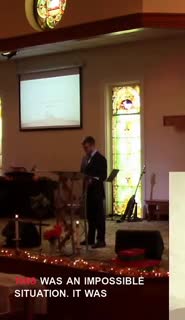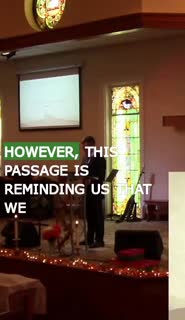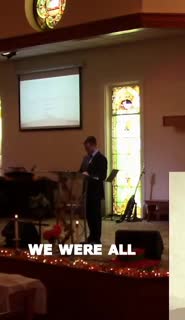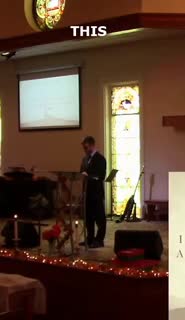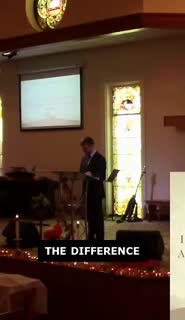God's Faithfulness: The Miracle of Isaac's Birth
Devotional
Sermon Summary
Bible Study Guide
Sermon Clips
1) "Now, Abraham is by far not a perfect man. We've seen that throughout the story. We've seen that he messes up time and time again, just like any of us. But something that we've always seen is his faithfulness to God. However, even more important than the faithfulness of Abraham, is the faithfulness of God. Every time that Abraham messed up and he lost faith in God and His plan, God welcomed him back with open arms. And none of the things that Abraham did could change the promise that God has made to Abraham." [00:33:02] (35 seconds)
2) "This was an impossible situation. It was physically impossible for Sarah to have a child. And that makes it so much more grand and so much more amazing when we see that God met Sarah in her inability and blessed her with a child. This was all out of His grace. It wasn't in her ability. It wasn't by her power. It was all by grace. Look, being able to create children at all is a huge blessing from the Lord. And it really goes to show that God is real, and I think any parent in here will attest to that." [00:41:05] (31 seconds)
3) "We cannot miss the fact that without this intervention of grace, there was nothing special about Abraham. He was just a man. The only thing special was that God looked at Abraham and said, I want to use you. He said, I want to use you to bring about my son. That's great. God didn't need Abraham. He could have used anybody. He could have done it without anybody. But he said, I want to use you, Abraham. And that's where we see grace." [00:43:40] (36 seconds)
4) "Paul here, he's reminding believers that we're children of promise. That we're not like Ishmael, we're not born of natural causes. The things that make us alive are miracles. It's the very miracle Jesus did on the cross that allows us to be born again. It's that very miracle that allows us to be set free from this world, to be set free from our slavery of sin. The Bible says that we were all once dead in our trespasses and our sins, but that the free gift of grace is eternal life." [00:48:44] (33 seconds)
5) "However, this passage is reminding us that we don't have to keep the law, law because we're under grace instead we don't live under the law we live under grace we can be in the presence of the Lord because of the blood of Jesus that covers us notice the comparison here Paul says that we're under grace we're not as children of slavery but we're children of promise and again he's referencing back to Genesis chapter 21 where he says that Isaac came of promise and Ishmael came of slavery." [00:49:56] (32 seconds)
6) "The law was only ever meant to reveal our sins to us. If the law was meant to cleanse us of our sins, then why would God have promised Jesus? You see, the law, it highlights our sins to us. It highlights the areas where we're sinful, but it doesn't fix the sin in the heart. Whether I know that something is sinful or not, I can't set myself free from it. And that's the point. Only Jesus can. The law cannot cleanse you. Only the blood of Jesus can." [00:55:26] (40 seconds)
7) "We were all once slaves of sin. Paul says that because of us being slaves of sin, we had fruit that was sinful and that now, as believers, we're ashamed of it. Paul was saying that we are no longer a slave of sin, but that we are a slave of God instead. And that this produces fruit that leads to sanctification, which in turn then leads to eternal life. This is where that famous verse that we always reference is. Romans 6 .23 says, For the wages of sin is death, but the free gift of God is eternal life in Christ Jesus our Lord." [00:56:32] (43 seconds)
8) "We get to serve him because of his grace. Not because of anything we did. Not because we deserve it. It's actually quite the opposite. I cannot thank any of my salvation to my work. But only to Jesus Christ, the one who died for my sin. To him be the glory. Isn't that what we were talking about last week? And the way that we vote, it should vote to glorify God. In the same way, the way that we view our salvation, it should aim to glorify God." [00:57:51] (34 seconds)
9) "This again, it shows the extent of God's grace. It shows the sufficiency of God's grace. God is so gracious and so loving that if we have faith, his grace towards us can affect the people that we love. Now don't hear me wrong, I'm not saying that if you have faith in the Lord that nothing bad is ever going to happen. Any believer in here can tell me that's not true. Bad things are going to happen. But I am saying that God cares about those we care about. And that his grace is sufficient for any problem if we're under the grace covenant." [01:03:31] (37 seconds)
10) "The difference between the majority of the world and us as believers. Is that we find that fulfillment in Jesus, not other things. There's nothing special about. You or me. It's only by the grace of God that I found Jesus only by the grace of God, that you found Jesus. His grace. It's sufficient to help anyone who's struggling in this broken world. No matter what you've been through, no matter what you've experienced, his grace, it's sufficient for you." [01:05:41] (33 seconds)
Ask a question about this sermon
2) "This was an impossible situation. It was physically impossible for Sarah to have a child. And that makes it so much more grand and so much more amazing when we see that God met Sarah in her inability and blessed her with a child. This was all out of His grace. It wasn't in her ability. It wasn't by her power. It was all by grace. Look, being able to create children at all is a huge blessing from the Lord. And it really goes to show that God is real, and I think any parent in here will attest to that." [00:41:05] (31 seconds)
3) "We cannot miss the fact that without this intervention of grace, there was nothing special about Abraham. He was just a man. The only thing special was that God looked at Abraham and said, I want to use you. He said, I want to use you to bring about my son. That's great. God didn't need Abraham. He could have used anybody. He could have done it without anybody. But he said, I want to use you, Abraham. And that's where we see grace." [00:43:40] (36 seconds)
4) "Paul here, he's reminding believers that we're children of promise. That we're not like Ishmael, we're not born of natural causes. The things that make us alive are miracles. It's the very miracle Jesus did on the cross that allows us to be born again. It's that very miracle that allows us to be set free from this world, to be set free from our slavery of sin. The Bible says that we were all once dead in our trespasses and our sins, but that the free gift of grace is eternal life." [00:48:44] (33 seconds)
5) "However, this passage is reminding us that we don't have to keep the law, law because we're under grace instead we don't live under the law we live under grace we can be in the presence of the Lord because of the blood of Jesus that covers us notice the comparison here Paul says that we're under grace we're not as children of slavery but we're children of promise and again he's referencing back to Genesis chapter 21 where he says that Isaac came of promise and Ishmael came of slavery." [00:49:56] (32 seconds)
6) "The law was only ever meant to reveal our sins to us. If the law was meant to cleanse us of our sins, then why would God have promised Jesus? You see, the law, it highlights our sins to us. It highlights the areas where we're sinful, but it doesn't fix the sin in the heart. Whether I know that something is sinful or not, I can't set myself free from it. And that's the point. Only Jesus can. The law cannot cleanse you. Only the blood of Jesus can." [00:55:26] (40 seconds)
7) "We were all once slaves of sin. Paul says that because of us being slaves of sin, we had fruit that was sinful and that now, as believers, we're ashamed of it. Paul was saying that we are no longer a slave of sin, but that we are a slave of God instead. And that this produces fruit that leads to sanctification, which in turn then leads to eternal life. This is where that famous verse that we always reference is. Romans 6 .23 says, For the wages of sin is death, but the free gift of God is eternal life in Christ Jesus our Lord." [00:56:32] (43 seconds)
8) "We get to serve him because of his grace. Not because of anything we did. Not because we deserve it. It's actually quite the opposite. I cannot thank any of my salvation to my work. But only to Jesus Christ, the one who died for my sin. To him be the glory. Isn't that what we were talking about last week? And the way that we vote, it should vote to glorify God. In the same way, the way that we view our salvation, it should aim to glorify God." [00:57:51] (34 seconds)
9) "This again, it shows the extent of God's grace. It shows the sufficiency of God's grace. God is so gracious and so loving that if we have faith, his grace towards us can affect the people that we love. Now don't hear me wrong, I'm not saying that if you have faith in the Lord that nothing bad is ever going to happen. Any believer in here can tell me that's not true. Bad things are going to happen. But I am saying that God cares about those we care about. And that his grace is sufficient for any problem if we're under the grace covenant." [01:03:31] (37 seconds)
10) "The difference between the majority of the world and us as believers. Is that we find that fulfillment in Jesus, not other things. There's nothing special about. You or me. It's only by the grace of God that I found Jesus only by the grace of God, that you found Jesus. His grace. It's sufficient to help anyone who's struggling in this broken world. No matter what you've been through, no matter what you've experienced, his grace, it's sufficient for you." [01:05:41] (33 seconds)

